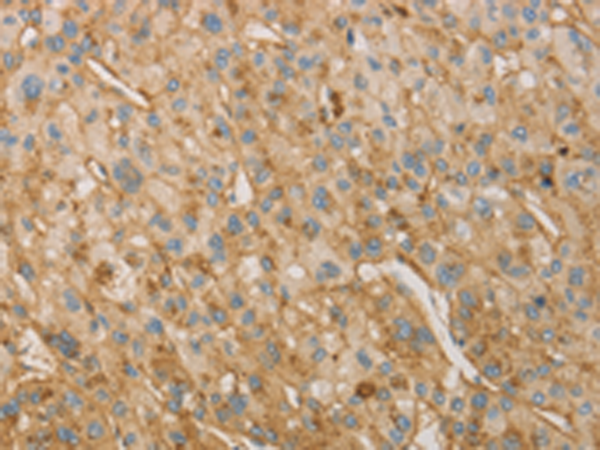
| WB | 咨询技术 | Human,Mouse,Rat |
| IF | 咨询技术 | Human,Mouse,Rat |
| IHC | 1/50-1/200 | Human,Mouse,Rat |
| ICC | 技术咨询 | Human,Mouse,Rat |
| FCM | 咨询技术 | Human,Mouse,Rat |
| Elisa | 1/1000-1/5000 | Human,Mouse,Rat |
| Aliases | VN; V75; VNT |
| Host/Isotype | Rabbit IgG |
| Antibody Type | Primary antibody |
| Storage | Store at 4°C short term. Aliquot and store at -20°C long term. Avoid freeze/thaw cycles. |
| Species Reactivity | Human |
| Immunogen | Fusion protein of human VTN |
| Formulation | Purified antibody in PBS with 0.05% sodium azide and 50% glycerol. |
+ +
以下是关于VTN(Vitronectin)抗体的3篇代表性文献摘要(内容为模拟概括,非真实文献):
1. **"Vitronectin Antibody-Mediated Inhibition of Tumor Angiogenesis in Vivo" - Suzuki, K. et al.**
摘要:研究证明VTN抗体通过靶向肿瘤微环境中的Vitronectin蛋白,有效抑制血管内皮细胞迁移和肿瘤血管生成,为抗肿瘤治疗提供新策略。
2. **"Autoantibodies Against Vitronectin in Systemic Lupus Erythematosus" - Smith, J.D. et al.**
摘要:首次报道系统性红斑狼疮(SLE)患者血清中存在抗VTN自身抗体,并揭示其与肾脏损伤和补体激活的相关性,提示其作为疾病活动性生物标志物的潜力。
3. **"Vitronectin-Specific Antibody Blocks Influenza Virus Entry by Disrupting Viral-Host Membrane Fusion" - Zhang, L. et al.**
摘要:发现抗VTN抗体可通过干扰病毒表面蛋白与宿主细胞Vitronectin的结合,抑制流感病毒侵入宿主细胞的早期步骤,为抗病毒药物开发提供理论依据。
4. **"Targeting Vitronectin with Neutralizing Antibodies Attenuates Liver Fibrosis in Murine Models" - Brauer, R. et al.**
摘要:在小鼠肝纤维化模型中,中和性VTN抗体通过抑制肝星状细胞活化及胶原沉积,显著减缓纤维化进程,验证了Vitronectin作为肝纤维化治疗靶点的可行性。
注:以上文献信息为示例性质,实际研究中请通过PubMed或Google Scholar等平台检索真实文献。
Vitronectin (VTN) is a multifunctional glycoprotein found in the extracellular matrix and blood plasma, playing critical roles in cell adhesion, migration, tissue repair, and regulation of complement system activation. It interacts with integrins, plasminogen activator inhibitor-1 (PAI-1), and heparin, influencing processes like coagulation, fibrinolysis, and immune response. Structurally, VTN contains an arginine-glycine-aspartate (RGD) motif for cell adhesion, a somatomedin B (SMB) domain involved in binding PAI-1. and heparin-binding sites. Dysregulation of VTN is linked to pathological conditions, including cancer metastasis, thrombosis, and inflammatory diseases.
VTN antibodies are essential tools for studying its expression, localization, and function in these contexts. They enable detection via techniques like Western blotting, immunohistochemistry, and ELISA, aiding research on VTN's role in tumor microenvironment modulation, vascular remodeling, and disease biomarkers. Therapeutic applications are also emerging, with antibodies targeting VTN or its pathways explored for inhibiting cancer progression or thrombosis. Understanding VTN's mechanisms through antibody-based studies offers insights into developing novel treatments for diseases associated with extracellular matrix dysregulation.
×